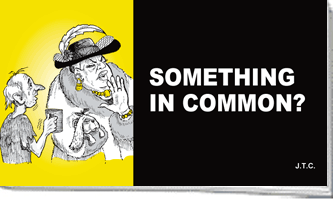What ever became of sin?
Albert Mohler, president of the Southern Baptist Theological Seminary says that words like "disease," "antisocial behavior," and "lack of moral development" have replaced the word "sin." This change of language exposes a major shift in modern morality.
Parents are increasingly frustrated that even "good" TV is becoming polluted and public school curricula is laced with the lies of evolution, sexual perversion and the "political correctness" of socialist and humanist philosophy. Christian pollster George Barna found that the majority of American adults view once unacceptable activities such as gambling, cohabitation and sexual fantasies as now acceptable. He also found that 30 to 45 percent approved of abortion, adultery, pornography, drunkenness and homosexuality.
Mohler references Psychiatrist Karl Menninger who wrote a book in 1973 entitled Whatever Became of Sin? Menninger declared that he was unable to categorize all human behavior as either neurotic or healthy. He saw no other choice but to use the well-worn term "sin" to identify man's determined rebellion against the rules.
Menninger's book, unfortunately, had little effect on modern culture. He hoped that the term and the concept would be retained. Psychologists rejected it, however. Instead, they declared that guilt from being called sinful was the root cause of mental illness.
This thinking has driven the word sin out of our language and the notion of sin out of our culture. Man is no longer considered sinful, but "uneducated," or "oppressed," or "discriminated against," or "disadvantaged" in some other way. Education or social justice and equality or political peace or some kind of therapy is presented as the solution to man's problem.
Unfortunately, many pastors have given up the biblical view of sin and bought into the view that therapy or social action is the solution. Even in many evangelical churches, repentance and forgiveness is downplayed for fear of offending people. In another study, Barna found that 49 percent of protestant pastors reject core biblical beliefs. Among Southern Baptists, 71 percent of the pastors held a biblical world view but only 27 percent of Methodists.
The idea of the nature of man's heart is at the core of the present culture war. Is the Bible right, that the heart of man is "deceitful above all things and desperately wicked"? (See Jeremiah 17:9.) Or is man's evil actions just a condition that he will eventually evolve out of.
The wonderful freedoms that we enjoy in America are the result of a constitution established by men who believed the biblical view. Checks and balances are in place to block the results of sinful forces when they threaten government stability.
Today, many voices are decrying the "coarsening" of our culture and the threats to our "quality of life." Even the Federal Reserve has found that there is a connection between prosperity and belief in hell. After studying 35 countries, they concluded that, "In countries where large percentages of the population believe in hell, there seems to be less corruption and a higher standard of living."
Unfortunately, we see a rising level of corruption in America as we lose our sense of sin. As Jack Chick illustrates in his newest tract, Something in Common, sin is something all humanity has in common. We ignore that fact to our peril. Not only does hell await the unrepentant sinner, but in this life, sin will reduce mankind to "a piece of bread." (See Proverbs 6.) Something in Common shows that all have a common need for salvation because sin is common to all of us.
- See more articles on related topics:
- Christian Growth
- Hell
- Other Subjects
Other Articles from March/April 2005:
- Missionaries using tracts supplied by Amazing Gospel Tract Fellowship
- Women on Welfare Required to Work in Brothels.
- Pope Declares 'Year of the Eucharist' — Grants Indulgences
- Who Owns Jerusalem?
- A Message From Jack Chick
- Chick Mail Bag March-2005
- One Thing You Can't Do in Heaven
- Prison Ministry Letters: March-2005
- Tract Passing Tips - March 2005
- Evolution's 'Proofs' Rapidly Vanishing
More on Other Subjects:
Products of Interest:
-

Tract Assortment
Big sample pack with 130 titles of world-famous Chick tracts. Have the right tract for ANYONE! Great stories, simple Gospel. 
Something in Common?
Do you have something in common with those going to heaven...or those going to hell?-

One Thing You Can't Do In Heaven
223 pages
What are you doing of significance today that will matter three-hundred-million years from now? You certainly cannot win a soul in heaven. Inspiration and ideas for witnessing.



